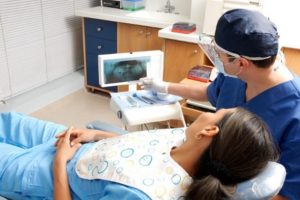Blog
What To Do If You Sustain A Dental Injury

Dental injuries happen. You may look after your teeth meticulously by brushing twice-a-day, going to all your regular dental appointments, and taking your dentist’s advice, but some situations cannot be predicted. There are a few injuries that we can sustain that are reasonably common, read more about these below:
Loose Teeth
Injuries caused by trauma can be as simple as a tooth coming loose. Teeth mobility can be due to sudden force or by gum disease over a period of time. If an individual has a loose tooth, the dentist may use a technique called splinting.
Splinting is where the tooth is place back in its original place and then attached to the adjacent tooth to help it remain in place. This can be done in one of three ways;
- With wires,
- Filling material or cement,
- Taking an impression and making a plastic splint.
The splint will need to be worn for a week or two to allow the area to heal.
Chipped Teeth
Pressure or shock induced dental injuries often result in chipped teeth, which is where a fragment of the tooth has broken off leaving the soft material of the tooth under the hard enamel exposed. There are several outcomes from a chipped tooth;
- Your dentist may smooth the edge of the broken section and cover it with tooth-coloured filling. This filling may be temporary, letting the area settle to ensure no further damage occurs. A permanent filling may be suggested later.
- If the blood vessels and pulp inside the tooth has been damaged, depending on the damage to this tissue may mean a root canal treatment may be needed to prevent the tooth dying or becoming infected.
- A dead tooth may also result in a root canal treatment. However, your dentist may decide to just extract the tooth and this will be the same case if your tooth is root fractured, meaning the fracture in the tooth runs below the gum line damaging the root of the tooth.
Please note that even if your dentist is treating the chip, the tooth could still die at anytime as a result of the trauma.
Knocked Out Teeth
Unfortunately, there are cases when people need an emergency dental appointment as a result of an avulsed tooth – a tooth that has been knocked out.
If a tooth is avulsed, make sure it is a permanent tooth, milk/baby teeth should not be replanted.
If you are unlucky and have an avulsed tooth, follow these steps for the best possible outcome;
- Make sure that you try and keep calm – or if you are with the person who this has happened to, try your best to keep them calm!
- Find the tooth and pick it up by the crown (the white part). Make sure you avoid touching the root.
- If the tooth is dirty, wash it briefly (max 10 seconds) under cold running water and
reposition it. Try to encourage the patient/guardian to replant the tooth. Once the
tooth is back in place, bite on a handkerchief to hold it in position. - If it is not possible to replant the tooth (e.g. an unconscious patient), place the tooth in a glass of milk or another suitable storage medium and bring with the patient to the emergency clinic.
- The tooth can also be transported in the mouth, keeping it inside the lip or cheek if
the patient is conscious. If the patient is very young, he/she could swallow the tooth. For this reason, it is advisable to get the patient to spit in a container and place the tooth
in it. It is best to avoid storage in water! - If there is access at the place of accident to special storage or transport medium (e.g.
tissue culture/transport medium, Hanks balanced storage medium (HBSS or saline)
such media can preferably be used. - Seek emergency dental treatment immediately.
If the tooth is broken do not try and put the tooth back in its socket. Contact the dental team straight away, as they will need to assess the damage done to the tooth through x-rays. The treatment received will depend on the damage.
Shifnal Dental Care feel that prevention is the best policy. This can be done by ensuring you clean your teeth efficiently, attend regular check-ups and by wearing a gum shield when playing any sport. Should you need an emergency appointment for a loose, chipped or missing tooth our expert dental team can help.
We hope that this article has provided you with useful information about dental injuries. For any further information or to book an appointment, please contact us on 01952 460119 or fill out our enquiry form.
Share this post:
